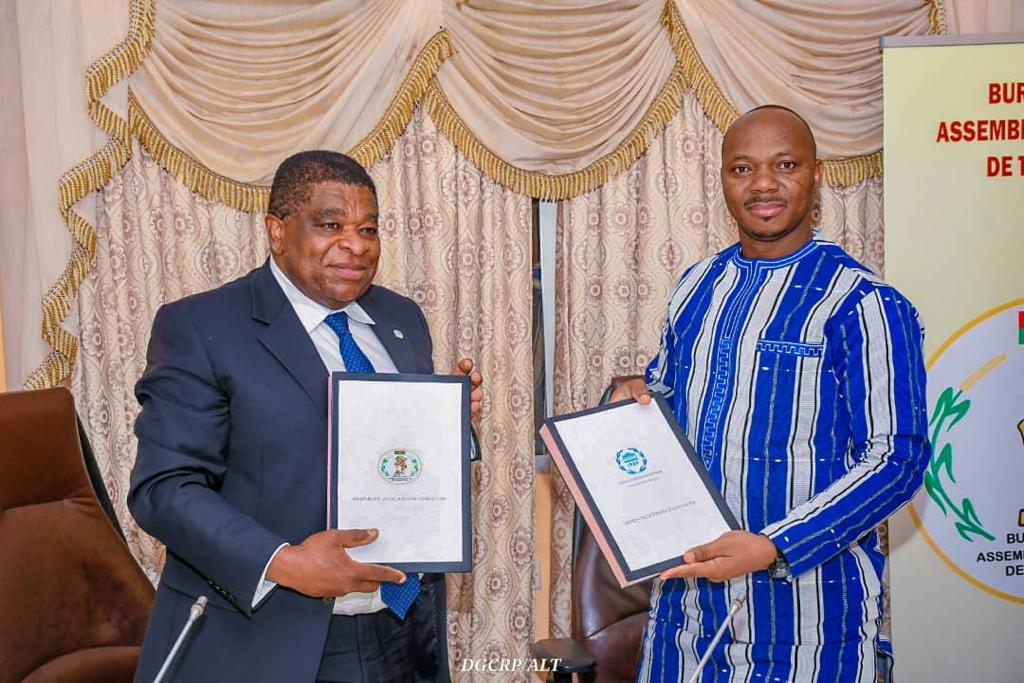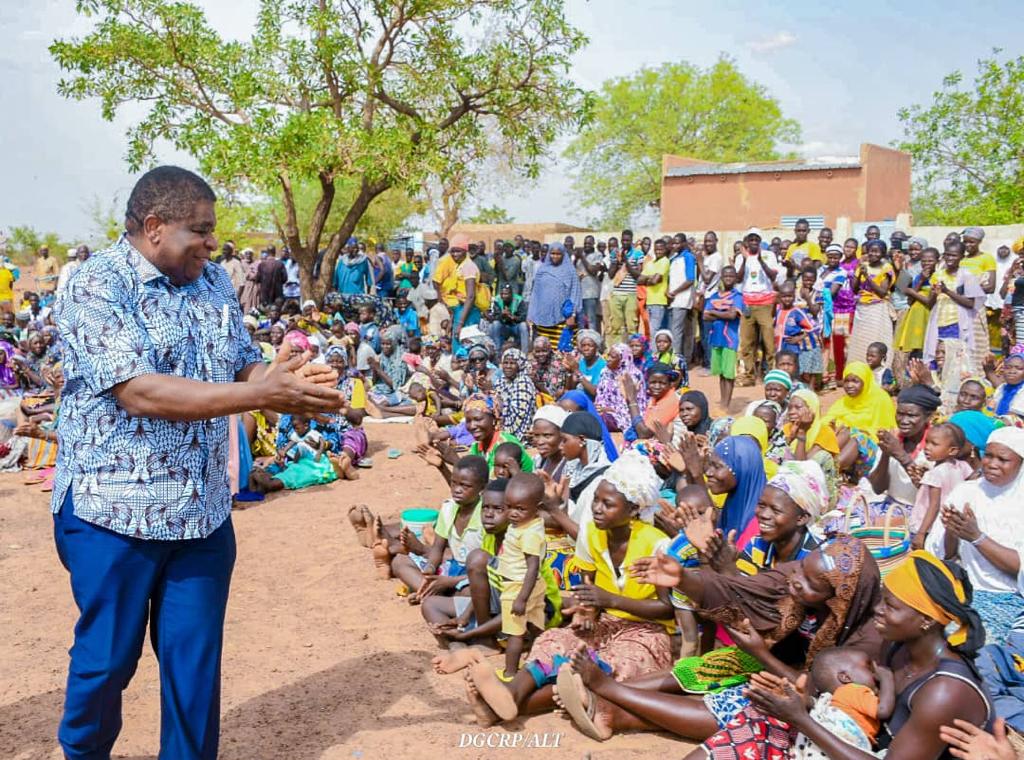Focus on the Sahel
IPU Long Read #1
Suffering six coups d’état in the past two years, the Sahel had a special focus at the IPU’s 147th Assembly in Angola, including, on 25 October, during the Second Global Parliamentary Summit on Countering Terrorism and Violent Extremism. The coups highlight serious failures of governance, but they can never be a long-term solution for the region, already under immense pressure from climate change, poverty and terrorism.
The IPU has condemned the coups time after time. But beyond the condemnations, what can the IPU and others do to address the emerging vicious cycle of political instability, insecurity and increasing poverty in the region?
“For the region’s people, the urgent priorities are food, water and security,” said IPU Secretary General, Martin Chungong. “For the wider world, the stakes are also high: this region is at the epicentre of global issues such as climate change, terror, population growth and displaced people.”
Accounting for seven of the world’s 46 least developed countries, the region faces armed violence, conflict and terror, as well as coups d’état. This instability undermines poverty reduction and has led to huge population displacements.
Last year, armed groups reportedly carried out more than 800 deadly attacks in the region, uprooting some 450,000 people within their countries and forcing a further 36,000 to flee elsewhere. The violence affected entire communities and left 2.5 million people displaced.
In Burkina Faso, Mali, and Niger, the humanitarian situation is made worse by extreme poverty and the growing impacts of climate change, illiteracy, unemployment, and lack of opportunities for young people.
Alarmed by the combination of terrorism and political instability, the IPU, in partnership with the United Nations Office on Drugs and Crime (UNODC) and the United Nations Office of Counter-Terrorism (UNOCT), organized the First Global Parliamentary Summit on Counter-Terrorism in Vienna, Austria in September 2021.
The Summit’s declaration – The Call of the Sahel – urges leaders to address the root causes of terrorism, poverty and insecurity, as well as to provide more support for the victims.
It also envisages meetings on environment, community, security, education and development between parliamentarians from the many countries who have experienced terrorism to collectively generate recommendations for each area. These recommendations will be discussed at the Second Global Parliamentary Summit in Luanda.
GROWING FRUSTRATION
The international community also recognizes that failure to ensure good governance has fuelled both poverty and insecurity in the region which explains, at least partly, why so many citizens have stood aside and watched – even supported – the military officers as they grabbed power across the region.
Between 2020 and 2022, for example, former French colonies Burkina Faso and Mali both had two coups, while Guinea also had one. There is strong evidence that the coups were well received by local populations.
Indeed, surveys and anecdote alike show a growing tolerance, if not support, for the idea of military rule. In a recent survey of 36 African countries, some 53% said they would consider a military government “if elected officials abused their power”. Just 38% expressed satisfaction with “democracy”.

THE TRANSITIONS
In May this year, Mr. Chungong, IPU Secretary General, travelled to Guinea, Mali and Burkina Faso, meeting with MPs from the region, hearing their grievances and vision.
Mr. Chungong argues that it is not democracy as a concept and as a system of government that is being challenged but rather the approaches to democracy and its institutions, people and practices that are delivering that democracy.
Many outside observers would prefer to see democratic institutions take root in the region but recognize that existing institutions have failed. Some of the military regimes appear to have the best interests of their country at heart.
Of the 71 deputies in Burkina Faso’s transitional legislature, some 20 were appointed by the head of State, 16 by the defence and security forces, 13 by the country’s regions, 12 by civil society organizations, and 10 by civil society. This shows that transitional bodies can often be more representative and inclusive than legislatures that emerge from supposedly democratic elections.
“I got involved to make a modest contribution so that my country will have peace and calm again,” said Mr. Ousmane Bougouma, the Speaker of Burkina Faso’s Transitional Legislative Assembly since September 2022.
“Each morning, I get up, I look at my kids, and I ask myself: what will their lives be like tomorrow when armed terror groups are slowly taking over my country, when we face an unprecedented instability.”
In Burkina Faso, the IPU is supporting the Transitional Legislative Assembly to develop transparent, inclusive and capable institutions, in line with the IPU’s regular work to build effective democratic institutions and the mandate of the governing bodies to support transitional legislative institutions to speed up the return to the constitutional order.
“Democracy cannot rest on its laurels,” said Mr. Chungong. “It has to keep self-correcting. A parliament which is inclusive and representative is more likely to articulate the diverse views of its constituencies, to deliver better health, education, employment and security for all.”
At the request of the three countries, the IPU will organize capacity-building activities for some of the members of the transitional bodies.
Mr. Martin Chungong, IPU Secretary General, and Mr. Ousmane Bougouma, the Speaker of Burkina Faso’s Transitional Legislative Assembly, sign a cooperation agreement.
ANGOLA ASSEMBLY
The IPU’s 147th Assembly brought a range of parliamentarians and experts from around the world to Luanda, including those who are directly concerned by the Sahel and those who have knowledge and experience on the region to share.
The Second Global Parliamentary Summit on Countering Terrorism and Violent Extremism discussed the nexus between coups d’état, governance, corruption and the proliferation of terrorism.
Another area in focus was the massive numbers of youth in the region. The Sahel has some of the world’s fastest growing populations, and a special session will look at how to turn the region’s youthful populations into an opportunity.
Finally, participants heard that development is the only solution. Discussions will examine how parliaments can be more inclusive and representative by, among other, engaging women, different regions, as well as faith-based and civil society organizations.
As the region searches for solutions to get back on the road to socio-economic development, as measured by the United Nations Sustainable Development Goals (SDGs), there will inevitably be challenges along the way.
But inclusive, transparent and resilient institutions will likely be key to breaking the cycle of political instability, as well as to putting in place the necessary framework to find solutions and build legitimate government. To that end, the IPU helps to facilitate the exchange of ideas, knowledge and technical expertise.
Mr. Chungong concludes: “As a matter of principle, any coup d’état should be condemned. However, we also need a certain dose of understanding to work with the coup leaders to ensure a swift return to constitutional rule that delivers more effective democracy and is consistent with the expectations of the people.”
Mr. Chungong visiting a community of displaced people in Nagreongo, near the capital Ouagadougou, in Burkina Faso.

“I got involved to make a modest contribution so that my country will have peace and calm again,” said Mr. Ousmane Bougouma, the Speaker of Burkina Faso’s Transitional Legislative Assembly since September 2022. “Each morning, I get up, I look at my kids, and I ask myself: what will their lives be like tomorrow when armed terror groups are slowly taking over my country, when we face an unprecedented instability.”
Case studies
Guinea
Guinea’s first democratically elected leader, President Alpha Condé, had been in power for 11 years when a coup very suddenly removed him from power. In the morning of 5 September 2021, special forces fought gun battles in the capital Conakry, then stormed the presidential palace to capture the president.
The coup leader, Lieutenant Colonel Mamady Doumbouya, explained via state media that he was the country’s new leader, accusing Condé of corruption and mismanagement. The global pandemic and rising bread prices had hit the country hard, while President Condé’s constitutional changes, which allowed him to run for a third term in office, were also deeply unpopular.
Nearly 48% of Guinea’s population were below the poverty line at the time of the coup, even though Guinea is one of the world’s largest suppliers of bauxite that is used to produce aluminium.
Following the coup, Lieutenant Colonel Doumbouya quickly mandated the National Transition Council to organize consultations to determine the country’s general direction.
Mali
Battling jihadist insurgencies in the north and centre of the country, Mali had two coups between August 2020 and May 2021. Both were led by Assimi Goïta, a military officer and leader of the National Committee for the Salvation of the People, the military force which seized power in the first coup after weeks of protest against the incumbent government.
President Ibrahim Boubacar Keïta was failing to tackle the country’s armed violence, corruption, the COVID-19 pandemic and flagging economy. And his removal from power – which involved soldiers on pick-up trucks, gunfights and even tanks – was greeted with widespread relief.
The second coup had much less popular support. It came just hours after the announcement of a new cabinet, which excluded two key military leaders, and observers viewed it as little more than a power grab.
Looking to the future, Mali faces a powerful combination of climate change, population growth and the ongoing crisis of insecurity.
Niger
Despite its vast uranium reserves, Niger is one of the poorest countries in Africa. It is also a key player in the region sharing borders with seven countries, including Burkina Faso and Mali.
As such, it is severely affected by insecurity which, compounded by an already dire economic situation, resulted in a coup on 26 July 2023.
On that day, members of the presidential guard, led by General Omar Tchiani, cut off the presidential palace in Niamey and detained Mohamed Bazoum, President since December 2020.
The Economic Community of West African States (ECOWAS), the United States, France, and the United Nations all strongly condemned the coup. Since as in Burkina Faso and Mali, the junta is a popular alternative to the previous government, there followed a stand-off between the Niger junta and ECOWAS which threatened military intervention if the deposed President was not reinstated.
Ignoring the injunctions of ECOWAS, the junta appointed a prime minister, Mr. Ali Mahaman Lamine Zeine, who set up a transitional government.
With extreme poverty in the country already estimated at 44% according to the World Bank, Niger now has to contend with international economic sanctions following the coup.




